|
|
|
Sort Order |
|
|
|
Items / Page
|
|
|
|
|
|
|
| Srl | Item |
| 1 |
ID:
143403
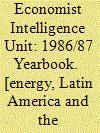

|
|
|
|
|
| Publication |
London, Economist Publication Ltd, 1987.
|
| Description |
158p.pbk
|
|
|
|
|
|
|
|
|
|
|
|
Copies: C:1/I:0,R:0,Q:0
Circulation
| Accession# | Call# | Current Location | Status | Policy | Location |
| 029209 | 505.550/EIU 029209 | Main | On Shelf | General | |
|
|
|
|
| 2 |
ID:
170217
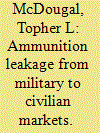

|
|
|
|
|
| Summary/Abstract |
The increase in the accessibility of firearms and ammunition represents a key factor of destabilization in many countries. It is also commonly associated with an escalation in intensity and organization of collective and interpersonal violence. In some cases, arms are illegally transferred via diversion from existing stores. In this article, we consider the leakage from military to civilian markets as an important source of ammunition available to civilians in Haiti. We employ a unique section-quarterly panel of ammunition prices on the Haitian civilian market over the period July 2004–July 2012. These data are combined with publicly available monthly data on authorized ammunition shipments to the country registered by the United Nations (UN) and Haitian National Police (HNP). We use a standard time-series Ordinary Least Squares (OLS) model to show that the exogenous shocks of UN- and HNP-ordered ammunition exert measurable downward pressure on civilian ammunition markets, which we calculate in terms of adjusted predictions and partial elasticities of demand. These effects constitute econometric evidence that the firewall that should in theory have separated military and civilian markets in Haiti partially broke down. We conclude with a suggestion for using this model to help estimate the specific size of the leakage.
|
|
|
|
|
|
|
|
|
|
|
|
|
|
|
|
| 3 |
ID:
153377
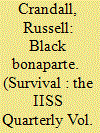

|
|
|
|
|
| Summary/Abstract |
The revolt of African slaves that erupted in Saint-Domingue in late August 1791 occurred in France’s most lucrative New World colony. Encompassing the western third of Hispaniola Island since 1659 and representing the most ‘profitable stretch of real estate on the planet’ according to historian Edward Baptist, the colony’s sugar, coffee, indigo and cotton served as the fuel for France’s ‘imperial engine’.1 Now, its sugar plantations were ablaze as slaves torched cane fields and killed their masters. With France’s own revolution having begun in 1789, free people of colour in Saint-Domingue also took up arms after French landowners refused to extend citizenship to them as laid out in the Declaration of the Rights of Man and of the Citizen. An independent Republic of Haiti was eventually established on 1 January 1804; by then, upwards of 350,000 Haitians and 50,000 French troops had been killed (the troops mostly from yellow fever), and the island nation’s economy lay in tatters.2
|
|
|
|
|
|
|
|
|
|
|
|
|
|
|
|
| 4 |
ID:
162628
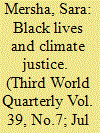

|
|
|
|
|
| Summary/Abstract |
This article shares examples of the leadership of Black communities and social movements in the struggle for climate justice, in four different parts of the world: resisting extraction and promoting community health in Nigeria; addressing extreme climate impacts and building people’s sovereignty in Haiti; confronting repression, defending territory and Mother Earth in Honduras; and cultivating community control and building a land-based movement in the US. Together, these examples have rich lessons to share around the importance of linking climate justice with racial justice; of combining strategies of resistance with those of creating alternative models; of maintaining focus on Black communities’ connections with land, territory and Mother Earth; of recognising and creating space for women’s leadership; and of intersectionality across geography and sector.
|
|
|
|
|
|
|
|
|
|
|
|
|
|
|
|
| 5 |
ID:
073002


|
|
|
| 6 |
ID:
139164
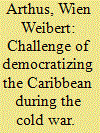

|
|
|
|
|
| Summary/Abstract |
This article examines the course of U.S.–Caribbean relations during the Kennedy years, considering Haiti as a case study. During the first year of Kennedy’s presidency, the U.S. policy toward Haiti was ambivalent. Duvalier’s regime displeased Kennedy since the beginning. Nevertheless, fear of Communism caused him to take a laissez-faire approach to the Haitian situation. The Haitian dictator was a Western ally in the Cold War, and U.S. intelligence believed that Castro or Haitian Communists could benefit from his removal. Starting in 1962, Kennedy did not hide his revulsion for the Haitian dictator. Cold War consideration, again, motivated his shift to an open and hostile position toward Duvalier. U.S. officials were afraid that Duvalier’s dictatorship would provoke a Communist revolution in Haiti. Factors that had been an asset to Duvalier led to his undoing. Kennedy, therefore, was resolute to bring a political change in Haiti and decided the best means would be Duvalier’s demise. However, U.S. limited economic sanction and incomplete military actions were insufficient to bend Duvalier. This study helps verify the reference of “the most dangerous area in the world” attributed to the Caribbean and Latin America during the Cold War era.
|
|
|
|
|
|
|
|
|
|
|
|
|
|
|
|
| 7 |
ID:
170587
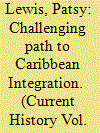

|
|
|
|
|
| Summary/Abstract |
Member states have not always been enthusiastic about implementing their obligations to further economic integration
|
|
|
|
|
|
|
|
|
|
|
|
|
|
|
|
| 8 |
ID:
081296
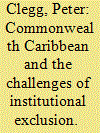

|
|
|
|
|
| Publication |
2008.
|
| Summary/Abstract |
The paper evaluates the changes that have taken place in the political economy of global trade, particularly the growing influence of international organizations and their rules and norms, and the institutional exclusion of the Commonwealth Caribbean that has resulted. The work begins by assessing briefly the dynamics of one of the last successful trade negotiations undertaken by the Caribbean (the agreement on a single European banana market in 1993). Since then the international trading climate has altered dramatically with negative consequences for the Caribbean's economic performance. The paper evaluates recent events in the agricultural (banana) and service (cross-border gambling and betting) sectors, which have highlighted attention on the highly influential role of the World Trade Organization (WTO). There is also a consideration of the process of diplomacy within the WTO and an evaluation of the Caribbean's efforts to secure its voice in the organization. In addition, there is an analysis of the reform processes undertaken by the European Union and one of its member states (the United Kingdom) that have impacted on Caribbean interests. The paper asserts that the Caribbean has been largely excluded from the decision-making processes of the powerful organizations referred to above and despite attempts has not yet understood fully that past strategies are no longer appropriate if the region's economic interests are to be secured in the future.
|
|
|
|
|
|
|
|
|
|
|
|
|
|
|
|
| 9 |
ID:
155141
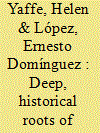

|
|
|
|
|
| Summary/Abstract |
Colonialism, imperialism and anti-imperialism have been decisive in shaping Cuban political identity for 150 years. US determination to control Cuba, consistent with the Monroe Doctrine, had a strong economic rationale even before Spain was defeated in the War of Independence in 1898. Debate raged between Cubans who aspired to true independence and an annexationalist minority, who favoured union with the US. The Platt Amendment imposed on Cuba by the US in 1903 ‘reduced the independence and sovereignty of the Cuban republic to a myth’. Between then and the Revolution of 1959 Cuba was effectively first a protectorate and then neo-colony of the US, which dominated the Cuban economy, politics and foreign policy. Tackling the terrible socioeconomic and political effects of Cuba’s subjugation under the Spanish empire and then US imperialism necessitated a radical transformation of the Cuban economy, political institutions and power structures. The transition to socialism inevitably meant confronting US imperialism – and vice versa. Since 1959, US imperialism, with its powerful allies in the right-wing exile community based in Miami, have relentlessly tried to destroy the Revolution and Cuban socialism. The issue of imperialism remains key today, in the post-Fidel, President Trump era.
|
|
|
|
|
|
|
|
|
|
|
|
|
|
|
|
| 10 |
ID:
074528
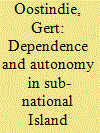

|
|
|
| 11 |
ID:
149835
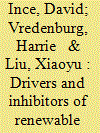

|
|
|
|
|
| Summary/Abstract |
We explore the factors that affect the development of renewable energy in the Caribbean. The Caribbean region can serve as a laboratory in studying the institutional issues relating to energy development due to the differences in political jurisdictions over a short distance. Based on 12 case studies and 75 in-depth interviews with a variety of stakeholders, we identified five factors that appear to be critical for the development of renewable energy in the Caribbean: entrepreneurship attitudes, the role of local champions, the electric utility influence, informal institutions and the influence of international agencies.
|
|
|
|
|
|
|
|
|
|
|
|
|
|
|
|
| 12 |
ID:
007942
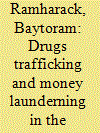

|
|
|
|
|
| Publication |
July 1995.
|
| Description |
319-341
|
|
|
|
|
|
|
|
|
|
|
|
|
|
|
|
| 13 |
ID:
149845
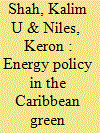

|
|
|
|
|
| Summary/Abstract |
Market integration efforts of Caribbean small island developing states have become transposed on the growing paradigm shift towards green economy pathways. Central to this is the challenge of implementing Caribbean energy policy in a manner that is aligned with green economy ideals and face the realities of regional indebtedness and environmental impacts. Here we analyze the current state of the Caribbean energy policy development arena and propose that the currently weak policy and institutional design regime might potentially benefit from the application of the Institutional Analysis and Design (IAD) model especially within the operational context of the green economy. It allows us to identify current policy dilemmas, bottlenecks and discrepancies and to disentangle some of them while offering up a way forward with others. We do not so much offer distinct recommendations but focus more on delineating how to clear the pathway for sound policy intervention and outcomes. By doing so we set forth a challenging agenda for future policy analysis research that will advance Caribbean energy policy in more robust ways.
|
|
|
|
|
|
|
|
|
|
|
|
|
|
|
|
| 14 |
ID:
116889
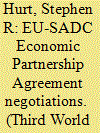

|
|
|
|
|
| Publication |
2012.
|
| Summary/Abstract |
This article focuses on the negotiation of Economic Partnership Agreements (epas) which form the central focus of the commitments made in the Cotonou Agreement, signed in 2000 by the European Union and the African, Caribbean and Pacific (acp) states. epas are part of a much wider trend witnessed since the creation of the World Trade Organization (wto), characterised by the proliferation of bilateral free trade agreements. The article argues that both the material and ideational interests of the EU need to be considered alongside the historical context of EU-acp relations. The EU is making a concerted effort to 'lock in' neoliberalism across the seven different sub-regions of the acp group by negotiating epas that include both reciprocal trade liberalisation and various 'trade-related' issues. In this way epas will go beyond the requirements for wto compatibility, resulting in a reduction of the policy space for acp states to pursue alternative development strategies. The article then considers the potential developmental impact of epas with reference to the negotiations with seven of the 15 member states of the Southern African Development Community (sadc). It is argued that the EU is promoting 'open regionalism', which poses a threat to the coherence of the regional project in southern Africa.
|
|
|
|
|
|
|
|
|
|
|
|
|
|
|
|
| 15 |
ID:
009322


|
|
|
|
|
| Publication |
Nov 1995.
|
| Description |
437-451
|
|
|
|
|
|
|
|
|
|
|
|
|
|
|
|
| 16 |
ID:
131216


|
|
|
| 17 |
ID:
157888
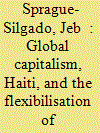

|
|
|
|
|
| Summary/Abstract |
This paper looks at the shifting manner in which paramilitarism has been reproduced in Haiti, examining how it has evolved from the Cold War into the era of capitalist globalisation. The central argument of this article is that paramilitarism has not disappeared but has been altered, and that this has occurred in part due to the changing strategies of elites in the global era. Rather than a permanent and widespread force, paramilitary groups are utilised in smaller numbers and only in certain ‘emergency periods’, serving a purpose of containment: targeting political threats and beating down those large populations whose social reproduction is not required by transnational capital. This has been a difficult situation for elites to manage, as they often have only limited control over such ruthless, corrupt and violent elements, which they sometimes require. Following the 1991 and 2004 coup d’états in Haiti, a military–paramilitary–bourgeoisie grouping has repeatedly worked to recover its impunity and revamp its coercive apparatus. Under these conditions, and even more increasingly in the wake of the 2010 earthquake, a variety of elites and technocrats (most importantly, US policymakers) have sought to politically remake the country alongside processes of economic restructuring promoted by transnational capital.
|
|
|
|
|
|
|
|
|
|
|
|
|
|
|
|
| 18 |
ID:
095183


|
|
|
|
|
| Publication |
2010.
|
| Summary/Abstract |
This article examines bi-regional governance between the European Union and Latin American and Caribbean countries as a source of social resistance and contestation. The analysis focuses on the contributions of a bottom-up and informal mechanism of litigation, the Permanent People's Tribunals against European Multinationals and Neoliberalism, to cognitive justice and as a challenge to the notion of neoliberal governance. It questions the underlying assumptions regarding global/regional governance and resistance in the literature on international relations and international political economy, and the type of development and regionalism promoted by EU institutions and governments in Latin America and the Caribbean. The article calls for a problematisation of the resistance that is mobilised through the Tribunals, which is not free of tensions but, nonetheless, contributes through practices of cognitive justice to unveiling the fragmented, and hence, contested, nature of EU neoliberal governance for Latin America and the Caribbean countries.
|
|
|
|
|
|
|
|
|
|
|
|
|
|
|
|
| 19 |
ID:
173445
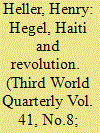

|
|
|
|
|
| Summary/Abstract |
Susan Buck-Morss’s argument that the Haitian Revolution embodied the most universal aspect of the French Revolution, namely the quest for universal freedom, relies on the supposed references to Haiti in the master–slave dialogue in Hegel’s Phenomenology of Spirit. The revolution’s lodgement at the core of this foundational text of Enlightenment universalism is, for her, about as convincing a demonstration as one can have of the universal significance of the Haitian Revolution. Marxists have opposed her venture, and demonstrated their hostility to post-colonial thinking, principally by claiming that the master–slave is an expression of European class conflict. This paper agrees with Buck-Morss that the Haitian Revolution critically affirmed the principle of universal freedom and, indeed, pushed the revolution in France and Europe in a radical direction. A better affirmation of the universal significance of the Haitian Revolution than the thoughts of Hegel is possible. The latter do not actually provide such affirmation, because racism, Eurocentrism and a hostility to political radicalism are fundamental aspects of Hegel’s thought. The alternative affirmation can be found in Marxist analysis. This paper outlines such an analysis, and concludes that post-colonialism of Buck-Morss’s sort is no substitute for the perspective provided by historical materialism.
|
|
|
|
|
|
|
|
|
|
|
|
|
|
|
|
| 20 |
ID:
151501


|
|
|
|
|
| Summary/Abstract |
Regional and hemispheric reconfigurations in Latin America and the Caribbean are increasingly mediated by Brazilian power, and the engagement of Guyana, Suriname and French Guiana with this emerging context is intriguing. They are tentatively moving away from a Caribbean region with which they are culturally contiguous, towards a South American continent in which they are geographically located. This is partly a reflection of the gradual opening up of the Northern Amazonian space that they share collectively, and also with Venezuela and Brazil. These processes are occurring as cause and effect of Brazil’s emergence as a regional – and even regionally hegemonic – power. With reference to wider debates on regionalism and hegemony, we analyse the uncertain consequences of these shifts.
|
|
|
|
|
|
|
|
|
|
|
|
|
|
|
|
|
|
|
|
|